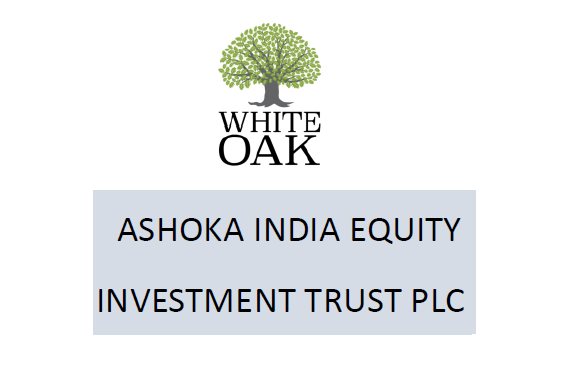Reasonable start for Ashoka India – Ashoka India Equity has announced its first set of results, covering the period from its listing until 30 June 2019. Over that period, it delivered a return on NAV of 11.0%, ahead of its benchmark, the MSCI India IMI Index, which returned 10.1%. However, the NAV return [which is designed to measure how good a job the manager is doing] is based on an opening NAV of 98p, after deducting launch expenses. The return to investors who bought in at launch at a pound was 9%. There is no dividend.
Ashoka India Equity offers investors an annual redemption facility and, surprisingly, some shareholders did opt to use it this year (after a remarkably short time). Redemption requests were submitted for 126,431 shares. However, this is more than offset by issuance of 4,477,830 additional shares since launch, pushing the size of the company up toward the £60m mark.
Top 5 contributors – extract from the manager’s report
The top 5 contributors to performance were, in descending order, Bajaj Finance, Axis Bank, HFDC Asset Management, Info Edge and L&T Technology Services. Collectively, these added 11.96% to the NAV.
“Bajaj Finance is India’s leading consumer lending franchise. Leveraging its industry leading technology deployment, it straddles across consumer, SME, commercial, rural and mortgage segments, primarily catering to mass affluent customers. It has delivered solid performance in a wider environment of tight liquidity and rising costs of funding. Bajaj Finance has a very low cost of funding due to an enviable track record of prudent balance sheet risk management and this puts it on a much stronger footing compared to the peer group, several of whom face liquidity challenges as explained earlier. It has a long runway for growth on the back of new customer additions as well as cross-selling opportunities, led by continued strong execution by management.
Axis Bank is the third largest private sector bank in India with an industry leading retail liability franchise as demonstrated by one of the strongest CASA (current and saving accounts) metrics and one of the lowest cost of funds across private Indian banks. It benefits from the structural shift of market share from public sector to private sector banks. Under the previous management team, the corporate banking division saw weak credit underwriting resulting in steep credit losses. However, a new strong and inspiring leadership at the helm of the group has brought in a renewed focus by reorganizing the senior management teams and, strengthening the credit underwriting and risk functions and putting the bank on a path to deliver industry leading performance over the coming years. In addition to its core banking activities, Axis Bank also derives significant value from other financial businesses such as wealth management (fourth largest in India), capital markets and asset management, each of which has significant headroom for growth. In our view all these factors will drive group RoE upwards into the high teens over the next three years. Axis Bank is attractively valued compared to its peer group and we believe that there is a strong case for an upward re-rating of the valuation as the long-term sustainable ratios evolve towards the best in the industry.
InfoEdge is India’s leading online classified advertising business. Its internet websites, Naukri.com and 99acres.com, are India’s premier jobs and real estate portals respectively. Naukri.com commands a 72% website traffic share whilst 99acres.com has a 50% market share. InfoEdge has also made highly successful investments in Zomato, India’s leading food delivery platform, and Policy Bazaar, India’s leading online insurance aggregator. InfoEdge has a dominant market position in the fast growing online classifieds industry and is run by an entrepreneurial management team that has a long track record of superior execution and prudent capital allocation.”
Top 5 detractors
The top 5 detractors took 4.97% off the NAV. They were Maruti Suzuki India, Jyothy Laboratories, Persistent Systems, Godrej Industries and Balkrishna Industries.
“Maruti Suzuki is the dominant player in the Indian passenger car market with 51% market share. The company has built a formidable franchise over the years by setting up a strong distribution network and continuously evolving to the changing needs of its customers. It has been witnessing volume decline in line with the cyclical slowdown in the auto sector. Passenger vehicle sales have suffered because of tight credit availability and impending cost escalations due to stricter emission norms. We expect Maruti to emerge stronger from this slowdown backed by a strategic alliance with Toyota and a strong pipeline of products.
Jyothy Laboratories is a consumer staples company with a strong portfolio across fabric care, dishwashing, household insecticides and the personal care segments. It has a dominant 71% market share in fabric whiteners and is the second largest player in the dish washing segment along with a niche presence in premium laundry and soaps. The market in India is fragmented with many unbranded, unpackaged and home-made products available, partially in the rural markets. This presents a long term structural opportunity for Jyothy to gain market share. The company’s stock price declined due to lower than expected earnings in the first quarter of 2019.
Persistent Systems has been one of the Indian IT leaders in the OPD (Outsourced product development) business where it caters to leading global software vendors such as IBM, Dell, Microsoft and HP. This segment accounts for 40% of revenues. The focus in the digital segment is on implementation of leading cloud solutions and enterprise software such as Salesforce, Appian and Oracle, and digital transformation for enterprise clients. It also has a portfolio of IP led solutions accounting for another 28% of business. Despite having strong capabilities across verticals, Persistent Systems has seen prolonged weakness in revenue growth primarily due to poor sales execution which we do not see turning round anytime soon. As a result we exited our position in Persistent Systems during the period.”
Click here to subscribe for free equity research on investment trusts, funds and listed companies.
